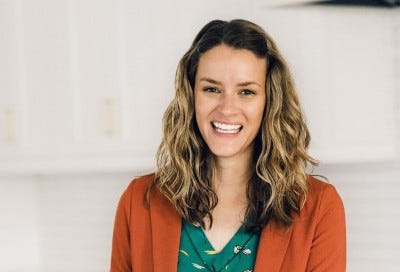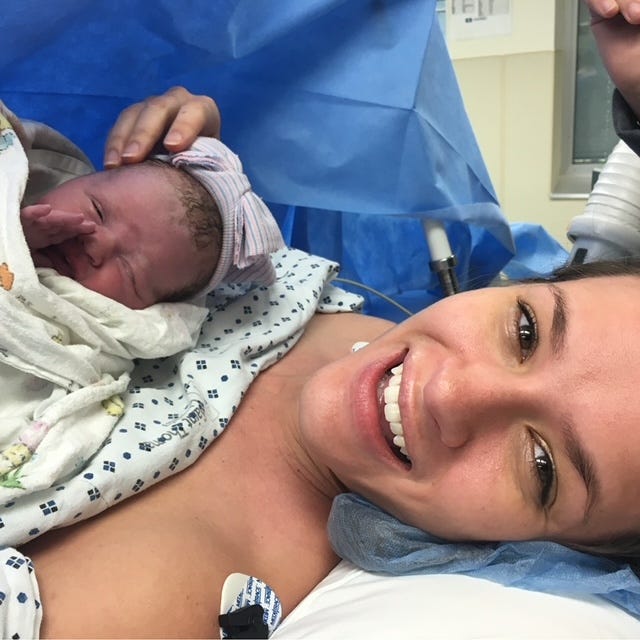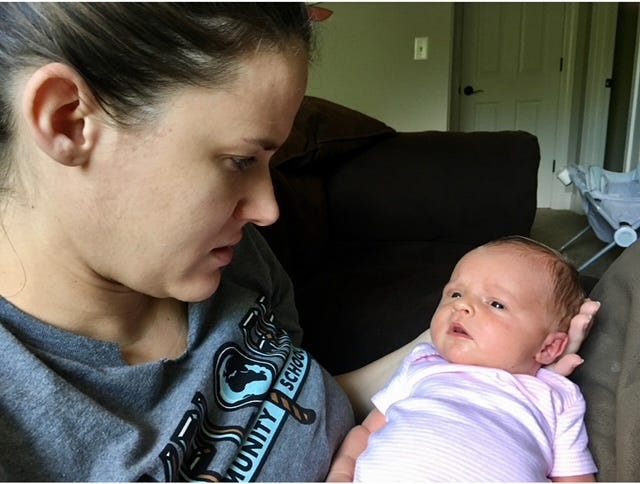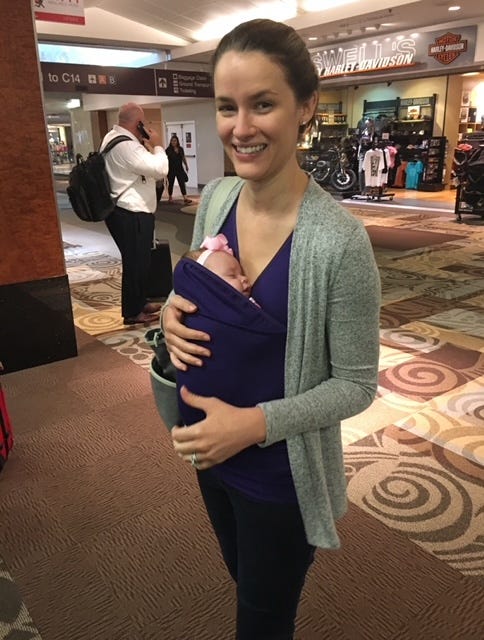Motherhood Identity Series with Mallory Whitmore, founder of The Formula Mom
This mom of two has created a supportive community for formula-feeding parents, helping them feel less alone in their journey.
All too often, women are left feeling guilty or ashamed if they can’t (or choose not to) breastfeed their child. While breastfeeding offers benefits, formula feeding is also a healthy and viable option for babies. In fact, research indicates that formula-fed babies develop just as well as their breastfed counterparts. Additionally, formula feeding can provide crucial mental health benefits for mothers by alleviating the stress, anxiety and guilt that can sometimes accompany breastfeeding struggles or complications.
There’s one mom who is working tirelessly to change the conversation and give support and confidence back to moms who use formula, either exclusively or as a supplement: Mallory Whitmore, M.Ed., the inspiring founder of The Formula Mom and Bobbie’s Education Lead.
As a mother of two, Mallory’s journey into motherhood coincided with her transition from a decade-long career in special education and disability services to becoming a full-time advocate and educator for formula-feeding families.
Mallory’s work with The Formula Mom aims to break down the barriers of this stigma, providing education and support to parents who choose or need to formula feed. What began as a passion project during the pandemic—a time when Mallory, like many, felt isolated—has since blossomed into a thriving community with more than 200K followers and 30K subscribers on The Formula Mom’s email list.
In just three years, she has built a supportive and informative space for parents navigating the challenges of formula feeding.
In this Q&A, Mallory shares her insights on balancing motherhood with entrepreneurship, her experiences growing The Formula Mom, and how she continues to empower parents through education with Bobbie. Join us as we explore her identity as a mother and business leader, and how she has shaped the conversation around formula feeding in the face of lingering societal pressures.
What inspired you to start The Formula Mom, and how has your goal/mission evolved since you started?
I started The Formula Mom in 2020 when our youngest was a baby—but it was my experience with our daughter in 2016 that set the foundation. My feeding experience with her was a challenge from the start—I had a planned C-section due to a complication, she was preterm, and neither my body nor hers was ready when it came to breastfeeding.
It was a mess of weight loss (her), pumping around the clock (me), constant visits to the pediatrician, supplementing… and feeling like a failure. When I finally switched exclusively to formula when she was six weeks old, I vowed to be the best, most educated formula-feeding parent I could be… and then I realized that there wasn't any education to be found about using formula. I stewed on that for years, and then when we decided to use formula from day one with our son and I still couldn’t find the support and information I needed, I decided to create it.
The mission has always been to develop the type of content I desperately needed and couldn’t find when I was a new mom using formula. It has evolved to include a call for support for all parents no matter how they’re feeding their baby, and to lay down the divisions between the “breast is best” and “fed is best” crowds so everyone can make the best, informed feeding choice for themselves based on their own needs and contexts!
How did feeding impact your early postpartum experience? When did you make the switch to formula?
The feeding journey I had with our daughter was inextricably linked to my postpartum depression. Those feelings of failure, of “She deserves more,” of “What good am I as a mom if I can’t even feed my baby?” led to a lot of really, really dark thoughts. The pressure to keep breastfeeding and pumping also created distance between us.
So often you’ll hear moms talk about how breastfeeding helped them bond with their baby (and I love that for them!) but for me, it was the opposite. Every time she would cry and I would need to feed her again, I felt anxiety, frustration… even resentment. It wasn’t until we switched to formula at six weeks that I was able to start truly bonding with my baby, because her need to eat was no longer in direct conflict with my need, at that moment with my PPD, to be in control of my body.
Additionally, switching to formula allowed several other pieces of my mental and physical health puzzle to fall into place: it meant that I could take the medication that my doctor recommended. It meant that my husband and I could trade off night shifts and I could get consolidated sleep. And it meant that my hormones got back to a pre-pregnancy baseline much faster.
It also meant I could leave the house for more than 90 minutes at a time to do things that made me feel like me again. All of these factors were crucial contributors to overcoming my PPD, and all were the result of switching to formula.
What are some common misconceptions about formula feeding—and why do you feel passionate to address them?
There are a few! First, that formula is “poison.” Many people don’t realize that all those scary sounding words on a formula’s ingredients list are simply the scientific names of micronutrients. While “pyridoxine hydrochloride” sounds industrial, it’s actually just the scientific name for vitamin B6. Formula includes the same macronutrients (protein, carbs, and fats) and micronutrients (vitamins and minerals) in the same general ratios that exist in breastmilk. Formula is the most regulated food in the world. There’s nothing scary or dangerous in the ingredients.
Another common misconception is that formula fed babies are less intelligent or more sickly compared to breastfed babies. While it’s hard to produce randomized control trials to evaluate these questions (because forcing half the participants to breastfeed would be unethical), sibling studies where one was breastfed and the other given formula show no statistically significant differences in all outcome measures, even through age 16. Emily Oster’s book, Cribsheet, is a great resource that reviews the high-quality research that exists and summarizes its key points!
How do you handle criticism for those who advocate for ‘breastfeeding is superior and the only option’ or don’t believe that ‘fed is best?’
I don’t think the two beliefs have to be in conflict, actually. I can believe that breast milk offers ideal nutrition for infants and know that it’s not the right choice for my family for a number of reasons. One doesn’t have to negate the other.
That said, what helps with criticism is reminding myself that the people who are staunchly anti-formula aren’t living the reality of many formula feeders’ lives. They might not have PPD, or be fostering a newborn, or have had a mastectomy, or need to go back to work two to three weeks after birth. “Fed is best” honors that there are a million reasons why someone may not want or be able to breastfeed, and that we can honor those experiences, and understand why it leads to formula feeding, even if it’s not our experience. Those who can’t get behind “fed is best” lack that empathy and perspective, in my opinion.
What role has your community played in the growth of The Formula Mom? How do you engage with your followers?
Community is everything! It’s what I’m most proud of in everything that I’ve done these past few years, because while I needed the information and education about formula as a new mom, what I needed even more was to know that other people were also formula feeding and were successful with it. I felt really isolated in my first year as a mom, and I am thrilled that those who stumble upon The Formula Mom IG page don’t have to feel alone in their choices and their experiences.
It’s become harder to engage with followers as the page has grown but I still try to make sure (with the help of Paige, my co-worker at Bobbie) to answer as many DMs as we possibly can. I know what it’s like having a question and not being able to find an answer, so as much as possible I try to stay on top of the inbox.
How do you balance your work/advocacy and personal life as a mom?
Not very well and with a lot of help! I have Paige who helps with The Formula Mom, I have a nanny who’s with my kids after school, and I have my husband’s family who lives in town. There’s no way I’d be able to do any of this without them.
I do think my work and family benefit each other though—I’m a better mom when I work (and use that other side of my brain in that way), and I’m a better worker, especially in this industry, because of my experiences as a mother. I’d like to find more balance in terms of my life outside of work and motherhood, but that’s a struggle. There are only so many hours in the day. I do read a lot which is something I do for just me.
You talk a lot about the pressures/guilt fueled by society about formula feeding. How do you empower mothers who feel judged about their choices?
Unfortunately, the feeding conversation is just one of many areas of judgment for moms—after feeding it becomes sleep training vs. not, purees vs. baby-led weaning, staying home vs. daycare, when you turn your toddler’s car seat forward facing, and so on.
I like to encourage new moms that, while it’s hard to make a feeding choice that others may not support, doing so strengthens a muscle that will serve them well as their motherhood journey continues. Learning to listen to yourself and honor the needs of your family, outside of, and even in spite of, the influence of external voices is the best way to thrive in this season. It’s hard work, but it’s worthwhile work.
I also encourage mothers that it’s okay to lean into their feelings. It’s okay to feel grief and to spend time grieving that your feeding journey didn’t turn out the way you wanted. It’s normal to feel jealous of those whose feeding journey did. It doesn’t make you a bad mom if you feel relieved when you start formula. It’s all welcome! The best way to get over bad feelings is to let yourself feel them and realize they don’t last forever. And also through therapy, which is always a good idea.
We still don't have a resilient supply of formula, and the government has not made progress to prevent a future crisis. What advice would you offer for parents navigating formula feeding and finding formula?
It’s been a tough couple of years to be a formula-feeding parent. While there is still a lot of room for improvement, I am glad to have seen some changes, on a policy level, as a result of the shortages. Namely, improved FDA protocols for surveillance, stricter testing and reporting guidelines, a push for allowing SNAP and WIC purchasing online, and the Infant Formula Made in America Act put forth by Rep. Rosa DeLauro and Senator Bob Casey. Progress takes time but I do think we’re heading in the right direction, albeit more slowly than anyone would like.
The best thing that parents can do to navigate formula feeding and finding formula amid shortages is to understand the composition of the formula that works for their baby. Babies can typically transition well between formula brands if the ingredients are similar.
So, for example, a baby who does well on Enfamil NeuroPro will very likely do well on Bobbie Organic because both contain 100% lactose for the carb source and a 60/40 whey:casein protein ratio. Really paying attention to the ingredient list and finding a close match is the best way to mitigate issues that come with unexpected shortages! It’s good to identify two to three formulas that you like and are similar in composition to have in your back pocket in case, before you find yourself panicked and without your normal formula.
We hear you’re writing a book and got a book deal! Congrats! Can you talk a little bit about what you’re writing about and why?
Thank you! Getting to write a book and have it published is a dream. Publishing takes time, however, so I’m waiting rather impatiently for Spring 2026 when the book, BOTTLE SERVICE, will be released!
It will be an easy to read reference guide full of information and inspiration, education and encouragement for the formula feeding parent. The goal is that a tired, sleep-deprived new mom can pick it up, find the topic she needs, and make her life easier (and her baby happier) as quickly as possible. It’s the sort of book I went looking for back in 2016 and couldn’t find. My hope is it helps parents feel confident in their feeding choices so that they can truly enjoy their baby’s feeding journey.
Looking back on your journey as a mom and entrepreneur, what advice would you give to new moms?
Ahh, so much! The biggest thing is that everything changes– the good and the bad. Nothing lasts long, so it’s best to hold on for the ride and enjoy what you can. I’d also say that it’s important to keep a hold of pieces of yourself that exist outside of being a mom or a wife.
It can be easy to get sucked into the vortex of needs that come with bringing a new baby home, and for me it took conscious effort to keep investing in pieces of myself that didn’t directly benefit my baby or our family. It’s worth it though! Even if it’s getting an ice cream cone at McDonalds once a week and talking with a friend on speakerphone for 20 minutes. It’s worth it.
Looking ahead, what future goals do you have for The Formula Mom?
In a perfect world, I’d love a future where a page like The Formula Mom doesn’t have to exist because everyone gets the support they need to feed their baby without shame or judgment! That doesn’t feel realistic at this point, though, so I’d love for the community to continue to grow and for my resources (and the upcoming book!) to find the people who need it. My only goal is to continue to help the moms who feel like I felt—who need direction and encouragement on their feeding journey with formula. If we can keep doing that, The Formula Mom will be a success.







